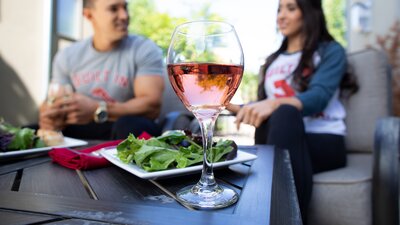
Alcohol Calculator: Blood Alcohol Content (BAC), Calories, Carbs
Planning to have a drink or two this evening? Find out how many beers, glasses of wine, or cocktails you can consume and still stay true to your fitness goals!
Alcohol | Calories | Carbohydrates | All Nutrition Calculators
Even when you're working toward an athletic or physique goal, it's nice to cut loose and have an adult beverage every once in a while. But how do you know when you've had enough? And what will that indulgence of some wine, beer, or a mixed drink do to your daily macronutrient or calorie goals?
This Alcohol Consumption Calculator will help you estimate your blood alcohol (BAC) level based on your body size, sex, and how many drinks you've had over a certain period of time. Want to know how many carbs are in that beer? The calculator also gives a rough estimate of how many calories and carbohydrates are in your drinks.
Alcohol Consumption Calculator
Note: This calculator only provides an estimate! It does not take into account any personal characteristics such as body composition, health, nutrition, or physical activity. All of these things can cause your actual BAC to differ from the results.
The calories and carb counts are also just estimates. They may not reflect the nutritional makeup of the actual drinks you consumed. And they definitely don't include the snacks you might have eaten with your drinks, or that food truck you may have visited after leaving the bar.
Here are your next steps:
1. Calculate Your Calories and Macros
Tracking your calories and macronutrients is a great way to take control of your nutrition and craft it to your goals. The Bodybuilding.com Macronutrient Calculator will give you a daily target for calories, but also the three macronutrients of protein, carbohydrates, and dietary fats.
2. Pick a Workout Plan
Want to look better at the club? Then you need to spend some time in the gym. Here are some of the most popular workout programs from BodyFit:
3. Learn About the Best Supplements for Gaining Muscle and Losing Weight
Supplements can help you accelerate your results once you have your calories and training nailed down. Krissy Kendall, Ph.D., shares her recommendations in the article, "8 Proven Supplements for Muscle Growth and Strength."
4. Join a Fitness Community
For over 10 years, members of BodySpace have been helping each other build their best bodies while still living life to the fullest. Join the world's strongest fitness community!
What does my blood alcohol level mean?
Blood Alcohol Concentration (BAC) represents the percent of your blood that is concentrated with alcohol at any given time. A level of 0.10 means that approximately 0.1 percent of your bloodstream is composed of alcohol. Here's how that often translates into symptoms:
0.020 - Feeling some light effects. Likely bragging about your bench press 1RM.
0.050 - Exaggerated behavior and lower inhibitions. Possibly suggesting a bodybuilding pose-down in the bar.
0.080 - Muscle coordination and driving skills are impaired. This is the legal intoxication level in most U.S. states.
0.100 - Slurred speech, impaired reasoning, and poor bodily control. You're likely embarrassing yourself at this point.
0.150 - Losing control of balance, risk of vomiting and/or falling. Someone needs to take you home, bro.
0.2-0.3 - Many people will black out or lose consciousness.
0.4 and above - Serious risk of death.
Don't take that chart as a challenge. Prioritize your health and safety—and the safety of those around you—by stopping before you do something you regret.
Which type of alcohol is best if I'm on a diet?
This is a tricky question because no amount of alcohol is necessary. And, as registered dietician Paul Salter explains in "Is Alcohol Wreaking Havoc on Your Physique," your body stops burning fat—and often starts storing it—when it has to process the ethanol in alcoholic drinks.
So from a weight-loss perspective, the best type is probably none at all—particularly if you tend to cut loose and start snacking after a couple of drinks.
That said, if you're going to choose to drink, some drinks are less calorically loaded than others. Mixed drinks often contain fruit juices, sodas, and other high-sugar additives that bump up both the calories and the carbohydrates—not a good choice if you're trying to lose weight.
Distilled liquor, on the other hand, typically does not contain any carbohydrates, and comparatively few calories:
Vodka, 1.5 oz: 97 calories
Whiskey, 1.5 oz: 97 calories
Tequila, 1.5 oz: 100 calories
Gin, 1.5 oz: 110 calories
So, if you're trying to keep it strict, consider ordering a drink—and maybe just one—straight up or on the rocks!
Is there a healthier way to consume alcohol?
Pacing your beverage consumption allows your body time to metabolize the alcohol, making it less likely that you'll overindulge.
You can also set limits on when and how much you drink. "The best way to balance your life with your physique goals is to keep your alcohol consumption to 1-2 drinks no more than twice a week, and refrain from snacking with wild abandon," Salter explains.
In addition to timing, you can utilize healthy substitutions and non-alcoholic mocktail recipes to help you enjoy cocktail hour without sabotaging your goals.
Add muscle-building and recovery-boosting BCAAs to your cocktail to keep your muscles happy when happy hour strikes! - View All
Get Systematic About Your Results
Getting strategic about to your alcohol consumption? It's time to take the same approach to the rest of your training and nutrition. These popular calculators can help you dial in your plan!




